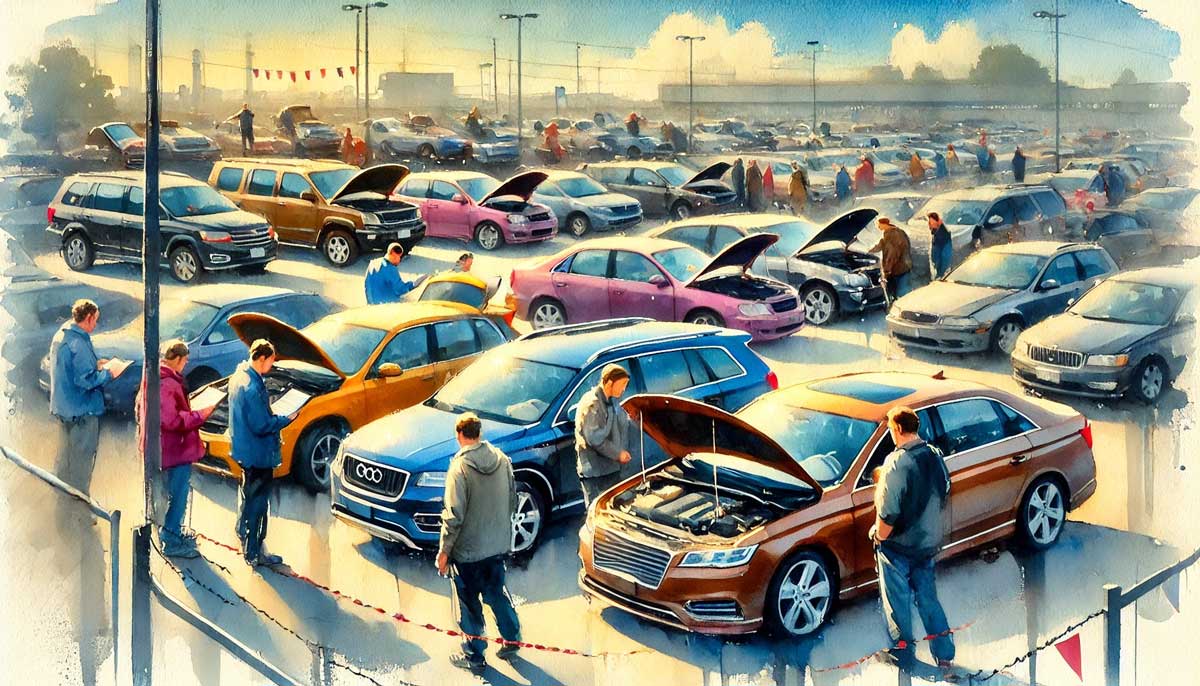 https://auction.ridesafely.com/images/2018/10/top-5-reasons-buy-at-car-auctions-banner.jpg
865
1440
RideSafely
/images/2025/01/ridesafely-logo.svg
RideSafely2025-11-14 10:28:342025-11-17 13:56:42Top 5 Reasons to Buy Your Next Vehicle at a Car Auction
https://auction.ridesafely.com/images/2018/10/top-5-reasons-buy-at-car-auctions-banner.jpg
865
1440
RideSafely
/images/2025/01/ridesafely-logo.svg
RideSafely2025-11-14 10:28:342025-11-17 13:56:42Top 5 Reasons to Buy Your Next Vehicle at a Car AuctionUnderstanding Salvage Car Auctions and How to Benefit from Them
Salvage car auctions have evolved significantly over the years. Previously, these auctions were exclusive to licensed dealers, but today, they are open to the public. However, professional dealers still hold an advantage due to their industry knowledge and licensing.
Our role is to bridge the gap between salvage car auctions and everyday buyers like you. Our blogs and FAQs simplify the auction process, providing the insights you need to navigate and succeed in this market.
Why Consider Salvage Car Auctions?
Many car enthusiasts and buyers know about traditional vehicle auctions, but fewer are aware of salvage car auctions. Your dealer friends may not have mentioned them because salvage auctions offer unique opportunities that traditional dealerships don’t want to share.
If you’re new to this market, check out our Guide to Salvage Titles: Identifying & Evaluating Damage to understand what makes a salvage car an excellent investment.
What Are Salvage Car Auctions?
Salvage car auctions sell vehicles that have sustained some form of damage. This can range from minor cosmetic issues to significant mechanical failures. However, many of these vehicles are repairable and can be resold for a profit.
How Do Vehicles Become Salvage Cars?
When a vehicle is involved in an accident, flood, or other damaging event, an insurance company assesses its loss in value based on several factors, including:
- Factory-based repair estimates, which are often high.
- Labor costs at certified collision repair facilities.
- OEM parts requirements, instead of more affordable aftermarket or used parts.
- Legal precautions, which may overestimate damage to avoid liability issues.
If the estimated repair costs exceed 70% of the vehicle’s book value, it is classified as salvage. This drastically reduces its market price—even though many of its parts may still be functional.
To better understand these insurance assessments, explore our Understanding Damage Codes: A Buyer’s Guide to Auto Auctions for a breakdown of common damage classifications.
The Hidden Value in Salvage Cars
Many used cars on the road today were once salvage vehicles. The difference? Their owners invested in affordable repairs rather than overpaying for high-end service center prices.
Think of it like shopping at a department store versus a luxury boutique—some buyers pay premium prices while others know where to find deals. The same applies to car repairs. By purchasing a salvage vehicle and repairing it cost-effectively, you can save thousands.
Types of Damage in Salvage Cars
Not all salvage cars have catastrophic damage. Some common issues include:
- Cosmetic damage (dents, scratches, minor frame issues)
- Mechanical failures (replaceable engine or transmission problems)
- Flood damage, which may only affect electronics rather than the entire vehicle
Additionally, look for the “Seller: State Farm Insurance” tag, which indicates that the vehicle is being sold by State Farm Insurance, a well-known insurance provider. After an insurance claim is settled and the necessary paperwork is processed, State Farm sells these vehicles at insurance auctions. These cars can be in various conditions, including:
- Theft recovery
- Biohazard vehicles
- Accident damage
- Abandoned, impounded, or repossessed status
With the right knowledge, you can identify fixable salvage cars and either restore them for personal use or resell them for a profit.
To explore the types of vehicles available, check out our Diverse Range of Vehicles Available at RideSafely for real-time listings.
How RideSafely Helps You Win at Salvage Car Auctions
RideSafely provides nationwide access to salvage auctions by compiling listings from multiple trusted sources, ensuring buyers have the best selection of vehicles. Whether you’re looking for a project car, a daily driver, or an investment opportunity, our platform makes the process simple.
Learn more about how RideSafely’s process works for Copart, IAA, and other auctions.
How to Buy Cars at Auction Without a Bid Card
Many potential buyers assume they cannot bid at insurance auto auctions because special dealer credentials are required. However, RideSafely removes these restrictions, giving public buyers free access to dealer-only auction listings without needing a bid card or dealer license to purchase a car.
Learn more about these exclusive savings in our guide: Buy Cars at Auction Without a Bid Card: Exclusive Savings with RideSafely.
Top Benefits of Buying Salvage Cars Online
Still wondering if salvage car auctions are right for you? Discover the Top 8 Benefits of Buying a Salvage Car from Online Auto Auctions and see how you can maximize savings and resale profits.
Start Bidding and Turn Your Knowledge Into Profits
Salvage car auctions provide incredible value, whether you’re purchasing for personal use or investment purposes. By understanding how to navigate these auctions, evaluate damage, and secure the best deals, you can build a profitable strategy in the used car market.
Ready to start? Browse RideSafely’s latest listings and begin bidding today! 🚗💰
Everything You Need to Know About Salvage Car Auctions – FAQs
What is a salvage car auction?
A salvage car auction is a marketplace where vehicles with prior damage—such as from accidents, floods, or theft recoveries—are sold at significantly reduced prices. These auctions allow buyers to purchase repairable cars for personal use or resale.
Who can buy cars from salvage auctions?
Previously, only licensed dealers could participate in salvage auctions. Today, the public can also buy salvage vehicles through platforms like RideSafely, which provides access to dealer-only auctions without requiring a bid card.
Why are salvage cars cheaper?
Salvage cars are sold below market value because insurance companies deem their repair costs too high relative to their book value. However, many of these vehicles can be repaired affordably and restored to full functionality.
Are salvage cars safe to drive after repairs?
Yes, but it depends on the level of damage and the quality of repairs. Some salvage cars only have minor cosmetic damage, while others may require more extensive work. Before purchasing, it’s important to understand damage codes and assess the cost of repairs.
Can I finance a salvage car?
Most traditional lenders do not offer financing for salvage vehicles. However, once a car is rebuilt and passes inspection, some lenders may finance it under a rebuilt title.
Can I insure a salvage car?
Insurance for salvage cars varies by provider. Liability coverage is usually available, but full coverage may be limited until the vehicle receives a rebuilt title. Check with your insurance company before purchasing.
What types of damage can salvage cars have?
Salvage cars can have a variety of damage types, including:
- Cosmetic damage (scratches, dents, or minor frame damage)
- Mechanical issues (e.g., transmission or engine problems)
- Flood damage (which may affect electronics but not always the drivetrain)
Learn more in our Guide to Salvage Titles to determine which vehicles offer the best value.
How do I place a bid on a salvage vehicle?
To bid on a salvage car, sign up for an auction platform like RideSafely, browse available listings, and submit your bid. You can bid directly or set a maximum bid to automate the process.
Can I inspect a salvage vehicle before buying?
In most cases, salvage cars are sold as-is, meaning you cannot test-drive them. However, detailed vehicle reports and damage code explanations can help you make an informed decision.
What is the difference between a salvage title and a rebuilt title?
- Salvage Title: Issued when a vehicle is deemed a total loss by an insurance company. It cannot be legally driven until repairs are completed.
- Rebuilt Title: Issued after a salvage vehicle has been professionally repaired and passed a state inspection, making it road-legal again.
What are the benefits of buying a salvage car online?
Buying a salvage vehicle online offers:
- Lower prices compared to traditional dealerships
- A wider selection of vehicles
- The ability to research and compare before bidding
Read our Top 8 Benefits of Buying a Salvage Car from Online Auto Auctions for a full breakdown.
How do I avoid buying a salvage car with hidden problems?
To minimize risks:
- Check the vehicle history report before bidding
- Understand the damage classification and estimated repair costs
- Compare auction listings to find the best deals
For more expert tips, explore our guide: Understanding Damage Codes: A Buyer’s Guide to Auto Auctions.
Can I make a profit by flipping salvage cars?
Yes! Many buyers purchase salvage vehicles, repair them affordably, and resell them at a profit. The key is understanding repair costs, title requirements, and resale values.
Where can I find salvage cars for sale?
Check out RideSafely’s latest listings for a nationwide selection of salvage vehicles available at competitive prices.
How do I start bidding on salvage cars today?
Simply create an account on RideSafely, browse available vehicles, and place your bid. Start saving big on your next car purchase!
See also: How do I start getting ready to bid on RideSafely?






Leave a Reply
Want to join the discussion?Feel free to contribute!